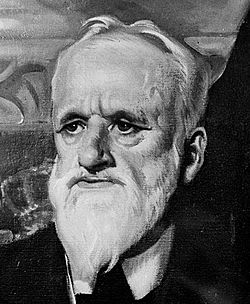Pieter Cort van der Linden facts for kids
Quick facts for kids
Pieter Cort van der Linden
|
|
|---|---|

Pieter Cort van der Linden
|
|
| Prime Minister of the Netherlands | |
| In office 29 August 1913 – 9 September 1918 |
|
| Monarch | Wilhelmina |
| Preceded by | Theo Heemskerk |
| Succeeded by | Charles Ruijs de Beerenbrouck |
| Minister of the Interior | |
| In office 29 August 1913 – 9 September 1918 |
|
| Prime Minister | Pieter Cort van der Linden |
| Preceded by | Theo Heemskerk |
| Succeeded by | Charles Ruijs de Beerenbrouck |
| Minister of Foreign Affairs | |
| In office 29 August 1913 – 27 September 1913 Ad interim |
|
| Prime Minister | Pieter Cort van der Linden |
| Preceded by | René de Marees van Swinderen |
| Succeeded by | John Loudon |
| Member of the Council of State | |
| In office 8 October 1918 – 1 January 1935 |
|
| In office 4 November 1902 – 29 August 1913 |
|
| Vice President |
See list
Johan Schorer (1902–1903)
Petrus van Swinderen (1903–1911) Joan Röell (1912–1913) Wilhelmus van Leeuwen (1918–1928) Alex van Lynden van Sandenburg (1928–1932) Frans Beelaerts van Blokland (1933–1935) |
| Minister of Justice | |
| In office 27 July 1897 – 1 August 1901 |
|
| Prime Minister | Nicolaas Pierson |
| Preceded by | Willem van der Kaay |
| Succeeded by | Jan Loeff |
| Personal details | |
| Born |
Pieter Wilhelm Adrianus Cort van der Linden
14 May 1846 The Hague, Netherlands |
| Died | 15 July 1935 (aged 89) The Hague, Netherlands |
| Political party | Independent Liberal |
| Spouses |
Joanna Wittewaall
(m. 1873; Johanna de Koning
(m. 1880; |
| Children | 4 sons |
| Alma mater | Leiden University (Bachelor of Laws, Master of Laws, Doctor of Philosophy) |
| Occupation | Politician · Civil servant · Jurist · Lawyer · Economist · Researcher · Historian · Academic administrator · Editor · Author · Professor |
Pieter Wilhelm Adrianus Cort van der Linden (born May 14, 1846 – died July 15, 1935) was an important Dutch politician. He served as the Prime Minister of the Netherlands from August 29, 1913, to September 9, 1918. He was known for leading a government that focused on individual freedoms and limited government involvement.
Contents
Pieter Cort van der Linden's Life and Work
Pieter Cort van der Linden was the last Prime Minister to lead a government based on liberal ideas for a long time. This means his government believed in free markets and individual choice. He was also the last liberal Prime Minister until Mark Rutte in 2010, which was 92 years later!
Keeping the Netherlands Neutral in World War I
One of Cort van der Linden's biggest achievements was keeping the Netherlands out of World War I. This was a very difficult task because the war was happening all around the country. Even though he personally had some sympathy for Germany, he made sure the Netherlands remained neutral. This meant the country did not take sides in the war.
Introducing Universal Suffrage in the Netherlands
Cort van der Linden also made a huge change by introducing universal suffrage in the Netherlands. This happened in 1917 and is known as the Pacification of 1917. Universal suffrage means that all adult citizens, both men and women, have the right to vote. Before this, only certain people could vote. This change was a big step for democracy in the Netherlands.
After the 1918 elections, the Social Democratic Workers' Party and the General League of Roman Catholic Caucuses gained more power. The Catholic politician Charles Ruijs de Beerenbrouck then became the new Prime Minister, taking over from Cort van der Linden.
Honors and Special Titles
Pieter Cort van der Linden received several important honors for his service to the Netherlands. These awards show how much his country appreciated his hard work and dedication.
- He was made a Knight Grand Cross of the Order of Orange-Nassau on August 1, 1901. This is a very high honor given for special service to the country.
- On January 28, 1915, he also became a Knight Grand Cross of the Order of the Netherlands Lion. This is another prestigious award for outstanding achievements.
- He was also given the special title of Minister of State on January 28, 1915. This title is given to people who have served the country in a very important way. It means he was addressed with the special style of Excellency.
Images for kids
 | Georgia Louise Harris Brown |
 | Julian Abele |
 | Norma Merrick Sklarek |
 | William Sidney Pittman |


